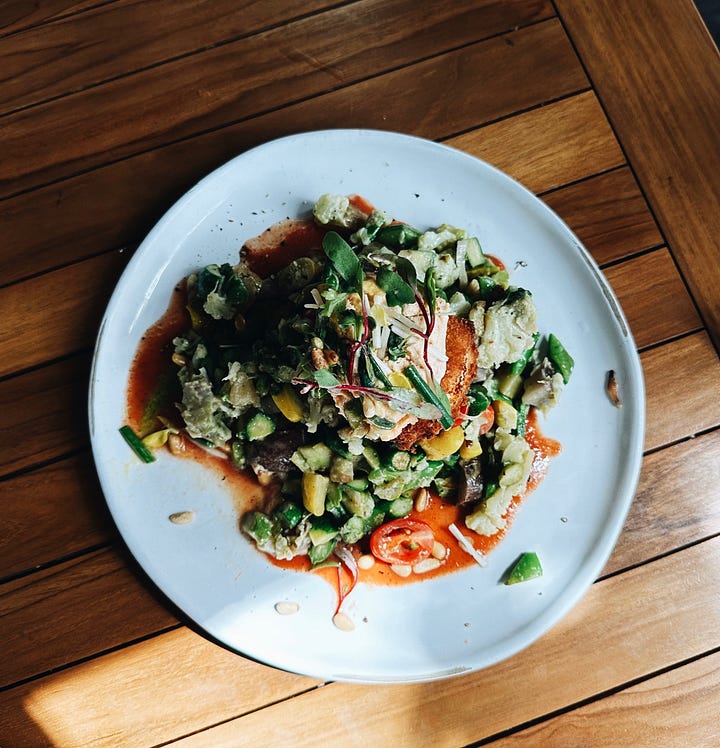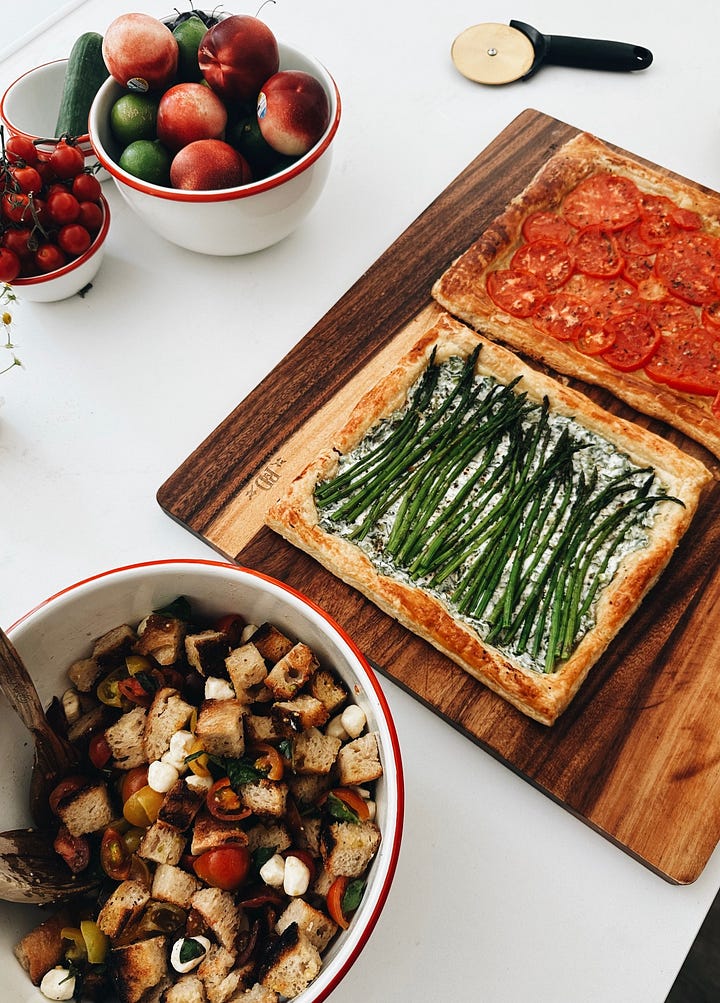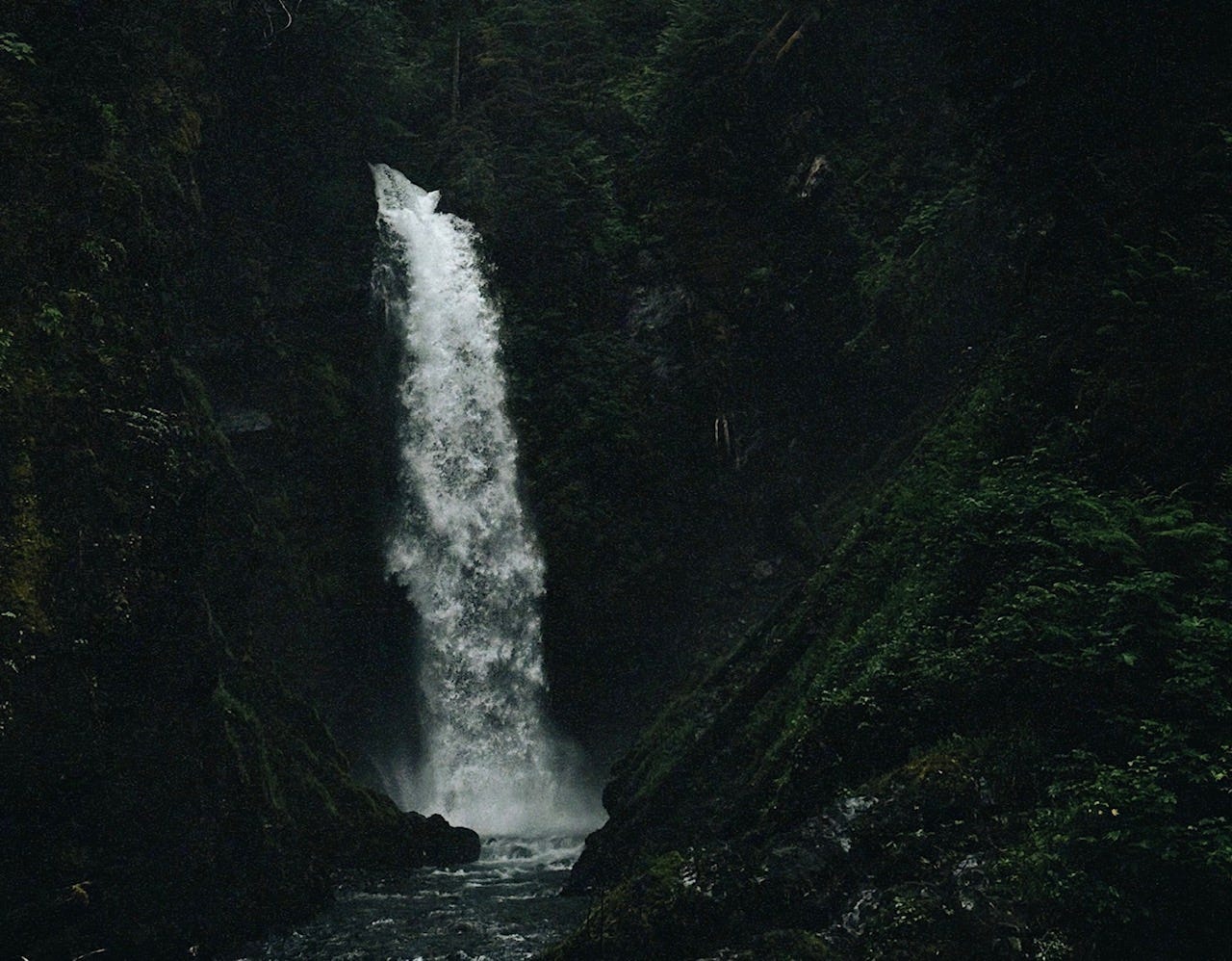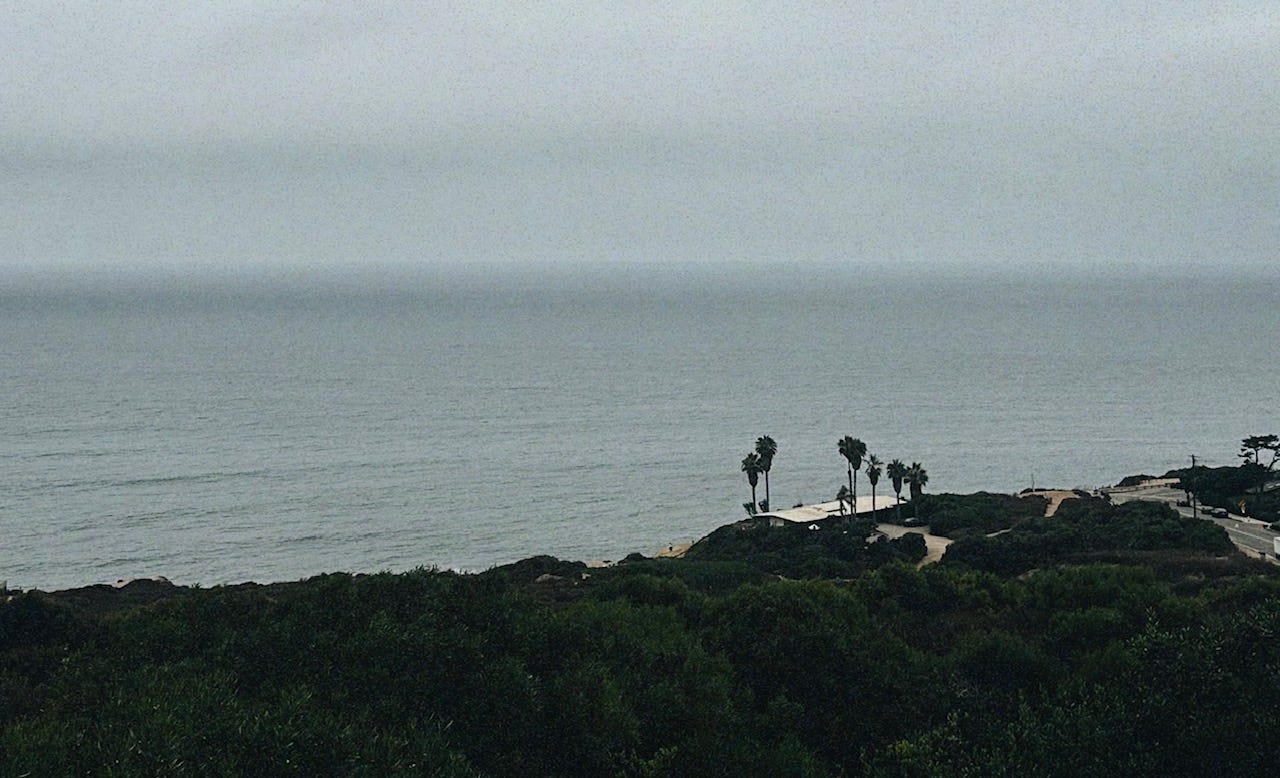Summer’s been delightfully mild, nowhere near the intensity of Las Vegas (a city so hot even the airport was stifling when I passed through a few weeks ago) or the miserable damp humidity of the south. But Southern California tricks its inhabitants with cool mornings and a lingering marine layer that culminates overnight, casting our mornings in gloom before the clouds burn off by 7 or 8 and the temperatures rise and rise until late afternoon.
In actuality, these are normal, expected temperatures of an American summer uninhibited by climate change (not that we’re uninhibited anywhere really). Two summers in San Diego, and I’ve rarely seen the thermometer cross the 90-degree threshold (though it’s a different story a few more miles east of the Pacific).
Still, I dream of four seasons, of camping in high elevation and waking to deep chill, of green leaves crisping towards gold.
Last night as I walked Lucy on the trails behind my apartment, I gazed up at a sycamore tree, mesmerized by its differentiating leaves against the backdrop of a rosy twilight sky. I don’t think they’re close to changing color but in that moment, standing beneath the canopy of gently wisping leaves, I pretended we were in the early stages of autumn, that summer wasn’t just figuratively ending with all the back-to-school messages or Michael’s Halloween decor, but literally. Colorado spoiled me and nothing on this earth can compare to the glory of aspen transformation, or witnessing their brilliance on a crisp September day.
It’s been a slow summer. A good summer. A summer made all the more enjoyable as a soon-to-be new student, returning to school 13 years after graduating. For the first time since graduation, I relished the pace and unencumbered time. I read fiction by the pool and hiked down steep embankments to near-vacant beaches, walked Lucy along the cliffs to witness perfect sunset after perfect sunset. I made Panzanella with homemade sourdough and chunky summer tomatoes, garnished with a heaping pile of fresh basil and thyme.




I laid on my paddle board beneath the unrelenting sun, rode the train north, drank watermelon gose, baked homemade cookie dough into a croissant (delicious), and visited my neighborhood coffee shack so frequently they know my order now (large coffee with cream).
Summer began with a trip to Japan and culminated with 10 days in the gloomy chill of the PNW where I hiked a river with dear friends to an off-the-grid waterfall, dined on fish-n-chips by the marina and marionberry cheesecake in the cool of the night, and returned to Deception Pass with trembling knees 180 feet above the shrouded, churning waters below.
I am ready for autumn, for any shift from sunny and hot to crisp and cinnamon-scented. But I cherished this summer and the gift of living in a coastal city where I can be at a beach in 15 minutes, where the sea and sunset never look the same.
Next week, I’ll begin a two-year Master of Arts in Writing program at a small coastal university. I’ll bask in the salt air, overlooking the great expanse of the Pacific. Truly, I’m astounded by the views and the opportunity to read and learn and grow in a micro-community of fellow word lovers.
Months ago before Jordan left for Japan, we sat at a restaurant with loud, pulsing music. I couldn’t think or focus or even properly taste the food before us. I said, “I’m so not a party girl. I can’t stand this music.” He looked at me with the most understanding eyes and said, “You’re a library girl.” It was an affirmation of me, my love of literature, my appreciation of any place where books are central. And soon, I’ll immerse myself in a new place with other “library folk,” lovers of literature and the written word.
Things I’m Loving
Essays: The Anthropocene Review by John Green
Someone told me every single essay in John Green’s The Anthropocene Review made them cry and now I understand why. Even the seemingly sillier subjects (like Diet Dr Pepper and Piggly Wiggly) reached a deeper level of feeling and human embodiment. I loved Green’s approach of reviewing the weird, beautiful, and hard things that exist in our Anthropocene era. Green writes about little joys and pandemic grief, enduring depression and life-changing Icelandic hot dogs. He’s humorous and thoughtful, goofy and compassionate.
Of all his essays, however, Green’s essay on sunsets hit me the hardest. His prose was just so captivating and beautiful. Living in San Diego, I witness more sunset than I ever did anywhere else and as a writer I want to write about this ordinary phenomenon but words often fail me.
Green finds the words here: “But I want to be earnest, even if it’s embarrassing. The photographer Alex Soth said, ‘To me, the most beautiful thing is vulnerability.’ I would go a step further and argue that you cannot see the beauty which is enough unless you make yourself vulnerable to it. And so I try to turn toward that scattered light, belly out, and I tell myself: this doesn’t look like a picture. And it doesn’t look like a god. It is a sunset, and it is beautiful, and this whole thing you’ve been doing where nothing gets five stars because nothing is perfect? That’s bullshit. So much is perfect. Starting with this. I give sunsets five stars.” (Page 99)
Fiction: When We Cease to Understand the World by Benjamin Labatut
This novel reads like non-fiction but according to the acknowledgment section, the book begins with mostly non-fiction storytelling and moves towards more and more fiction as the story builds. I’ve read a few books this year that feel too smart for me, written by scientifically-minded writers who can grasp concepts like technological advancement and quantum physics (I cannot). Somehow, Labatut’s short novel was entirely over my head and also attainable. It’s about hubris and folly, the ways scientific discovery can lead to cataclysm and madness. It’s about the human desire to know and how too much knowledge can be a huge, unrecoverable burden.
Substack: This conversation I had with
about sensory engagement, embodiment, and wonder.Podcast: Search Engine: What Does It Feel Like to Believe in God?
I can’t stop thinking about this conversation between host P.J. Vogt and Zvika Krieger—a rabbi and spiritual leader who writes and talks about the shapeshifting nature of religion and “updating our conception of God.” I found the conversation so wholesome and respectful, though Vogt is unreligious and Krieger very much is. There was mutual compassion and curiosity that led to a generative discussion of wrestling, asking big questions, avoiding certainty, finding spiritual meaning in the things that give us joy and purpose.







Completely envious. I jammed out my graduate degrees just to do something else it would be super fun to go back and not even declare a major. I would bounce back-and-forth between anything astronomy and more soil science. Just pay by the hour and show up to classes that sound interesting and fun!
🤣🤷♂️
What can I say, I’m pro fun .
Ah, thank you for the callout Sarah! And I'm adding both those books to my list...